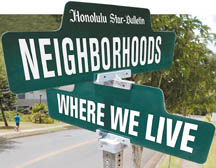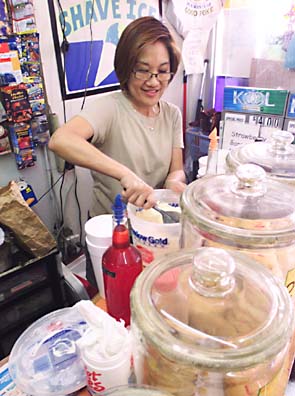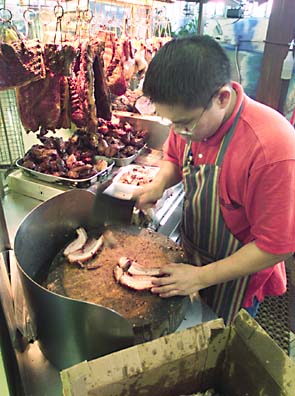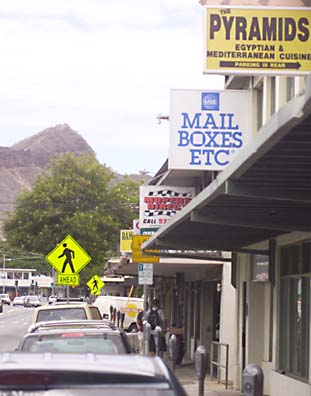
Every city needs districts like Kalihi Kai, a mixed plate of small stores and shops, warehouses and factories, humble wooden homes and cinder-block apartments. A subsection of larger Kalihi set off by Dillingham Boulevard, even with rutted, narrow streets and an underbelly personality, it lures those who know of its treasures, like Alicia's Market, where the best boiled peanuts and roast pork can be had at prices few other purveyors can match. It's a place where no-nonsense enterprises can carry on, undisturbed by the glitz that a tourism-based economy demands.
Kapahulu, meanwhile, operates on the fringe of visitor-centric Waikiki, benefiting from its proximity when price-shocked tourists seek relief. The neighborhood is spiced with ethnic eateries and, oddly, favored by a network of stores that cater to outdoor enthusiasts.
Kalihi Kai | Kapahulu
BACK TO TOP |
RICHARD WALKER / RWALKER@STARBULLETIN.COM
Cynthia Mori scoops ice cream for an order of shave ice at Alicia's Market.
Blue-collar workers
keep locale livelyFast-food outlets cater to the many
laborers employed in the area
Bulldozers crushed kiawe bushes and hauled away dirt to pave Mokauea Street beside Leonard Kam's house in Kalihi Kai in 1964. Eight-year-old Kam watched from his home, thrilled that a paved road would replace the dirt one.
He no longer had to trudge through the mud on rainy nights, he said.
Now warehouses line the streets of Kalihi Kai. Sidewalks are scarce, and concrete block buildings boast signs -- auto detailing, sheet metal businesses and a noodle factory.
This part of Kalihi, makai of Dillingham Highway, hosts a number of light industrial-business manufacturers, distributors and retailers. Small businesses have also popped up here and there and cater to those who work in the area.
Kam, now 47, manages Alicia's Market on Mokauea Street, which his parents opened in 1949.
The "mom and pop" shop has survived 54 years through the rise of many warehouses, mainly because of its customer satisfaction, according to Kam.
"Always give the customers what they want. It's hard to gain a new customer, but easy to chase them away," he said.
RICHARD WALKER / RWALKER@STARBULLETIN.COM
Dion Mori chops up some roast pork at Alicia's Market, a popular store in the Kalihi Kai area.
Alicia's Market specializes in poke, char siu pork and other pupus.
The market has a large clientele, including "blue collar workers who work in the area," Kam said. Fierce customer loyalty keeps the store going, he added.
Other small businesses in Kalihi Kai also cater to workers in the area.
Lester Yonamine, who owns Lox of Bagels off Sand Island Access Road, believes the area is ideal for small businesses that serve "fast food."
"People can order, pick up, and take out. And it's fast enough to do on their lunch break," he said.
"Big businesses need small businesses and vice versa," according to Yonamine, who serves a variety of bagels, sandwiches and spreads.
"And everyone who works around here has to eat somewhere."
The "big businesses" in the area are the manufacturers that base facilities in Kalihi Kai because of its location.
Watanabe Floral's biggest facility is in the area. Its warehouse on Hart Street is where most flower arrangements and leis are made, according to its president, Russel Watanabe.
He described the area as "a light-industrial business mix" where businesses can utilize space and location to maximize productivity.
"That's what this area is meant to be," he said.
Watanabe Floral imports a lot of flowers from the Big Island. Proximity to the airport and harbor are key, Watanabe added.
Kalihi Kai is also close to Waikiki, downtown and Likelike Highway, which allows Watanabe Floral central access to the entire island.
"We're centralized," Watanabe said. "For us, that important."
BACK TO TOP |
RICHARD WALKER / RWALKER@STARBULLETIN.COM
Kapahulu Avenue has a variety of shops and restaurants.
Many shops, eateries
are in the area
Kapahulu translated from Hawaiian means the worn-out soil, or the nightmare.
Some who work and live near Kapahulu Avenue can relate to the second definition, especially when it comes to traffic.
"People drive too fast and I see too many accidents," said Ron Cotten, co-owner of Island Paddler, which opened six years ago at Kapahulu and Date Street.
"They gotta slow it down for safety reasons ... make it like a second Kalakaua (Avenue)."
The nearly 2-mile stretch from the H-1 freeway to Kuhio Beach is an eclectic mix of restaurants and other businesses.
"I think it's a great neighborhood," said Frank Smith, owner of Island Triathlon and Bike.
"In Waikiki, if the food tastes like hell, nobody cares because tourists come and go ... but here everyone depends on return customers and so it has to be good."
Dayton Asato, whose grandfather started K.C. Drive Inn, which relocated to the mauka end of Kapahulu about 20 years ago, said he envisions his neighborhood as a "major eating destination" for tourists and locals.
"We have like 40 or 50 restaurants down this one street," he said.
"There's a bunch of Chinese restaurants, Indian, Mediterranean. ... You could come here and eat for weeks and not eat the same thing twice."
Smith points out that Kapahulu is also a shopping destination for outdoor enthusiasts.
"People talk about the restaurants, but there's also something like 15 athletic and water sports-type shops here," he said. "There's Soccer Locker, Turbo Surf, Maui Sporting Goods, Running Room. ... At one point I was trying to create a sub-business association consisting of just the Kapahulu sports shops."
Smith and other Kapahulu business owners say the key to surviving is finding a way to stand out. "Yeah, you need a niche," said Cotton. "We're lucky because there are a lot of paddlers in Waikiki come through Kapahulu and see the store."
Curt Taguma, manager for Maui Sporting Goods, agrees.
"All we carry are spearfishing/free-dive fishing supplies," he said. "And this little store covers all the needs for customers in the Waialae, Manoa and town area."
But while Kapahulu business is good, residents say the neighborhood could look a whole lot better, especially for a busy back door in and out of Waikiki and Diamond Head.
"It's a run-down-looking street," said Art Ross, chairman of the Kapahulu/Diamond Head/St. Louis Heights Neighborhood Board. "We had grand plans once to beautify the area, plant trees, bike paths, canoe halaus and a new senior citizen home.
"The truth is, we get overlooked a lot by the city. ... Kapahulu isn't a neighborhood that has a lot of money spent on it."






